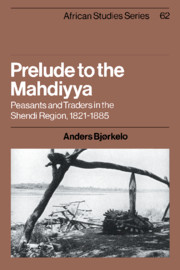Book contents
- Frontmatter
- Contents
- Figures
- List of maps
- List of tables
- Preface
- Acknowledgements
- Abbreviations
- Weights and measures
- The Sudan in the nineteenth century
- Introduction
- 1 The Ja'alī Kingdom of Shendi and its destruction
- 2 Shendi's economy on the eve of the Turkiyya
- 3 The Ja'aliyyīn under Turkish administration
- 4 The transformation of agriculture
- 5 Taxation
- 6 The transformation of commerce
- 7 Conclusion: dispersion and return
- Appendix: Three contracts from the archive of 'Abd Allāh Bey Ḥamza
- Notes
- Sources and bibliography
- Index
- OTHER BOOKS IN THE SERIES
- Frontmatter
- Contents
- Figures
- List of maps
- List of tables
- Preface
- Acknowledgements
- Abbreviations
- Weights and measures
- The Sudan in the nineteenth century
- Introduction
- 1 The Ja'alī Kingdom of Shendi and its destruction
- 2 Shendi's economy on the eve of the Turkiyya
- 3 The Ja'aliyyīn under Turkish administration
- 4 The transformation of agriculture
- 5 Taxation
- 6 The transformation of commerce
- 7 Conclusion: dispersion and return
- Appendix: Three contracts from the archive of 'Abd Allāh Bey Ḥamza
- Notes
- Sources and bibliography
- Index
- OTHER BOOKS IN THE SERIES
Summary
The nature and scale of the appropriation of a surplus from the producers by the ruling class changed profoundly with the installation of the new colonial regime. Again it was the primary producers, and the peasants more than the nomads, who were to carry the largest burden. The Turks demanded taxes (⃛ulba, from ⃛alaba, to ‘ask’, or darība, pl. ḍarā'ib, from ‘beat’, ‘hit’, ‘impose’), both in kind and in cash, and thereby enforced monetisation upon a society that knew only barter and local media of exchange, and very few metal coins outside the market centres. This policy stimulated the growth of a class of merchants and moneylenders and weakened the position of the commoners still further. In one sense, the increasing interest of the merchants in agriculture can be seen as an attempt both to overcome the commercial set-backs caused by the monopoly system in the first half of the Turkiyya and to exploit the taxation system to introduce usury capital into the agricultural economy.
More than anything else perhaps it was the question of the tulba that came to darken the relationship between the Ja'aliyyīn and the Turks, leaving a strong imprint on presentday memories and evaluations of the Turkiyya. The revolt of the Jafaliyyin in 1822 and the burning of Ismā'īl Pasha was triggered off by what was felt to be unreasonable demands for tribute. There is a Ja'ali proverb attributed to the Turkiyya, 'ashara ru'ūs fi'l-turba wa-lā riyāl fi'l-⃛ulba, ‘better ten heads in the grave, than a dollar in tax’.
- Type
- Chapter
- Information
- Prelude to the MahdiyyaPeasants and Traders in the Shendi Region, 1821–1885, pp. 82 - 103Publisher: Cambridge University PressPrint publication year: 1989

